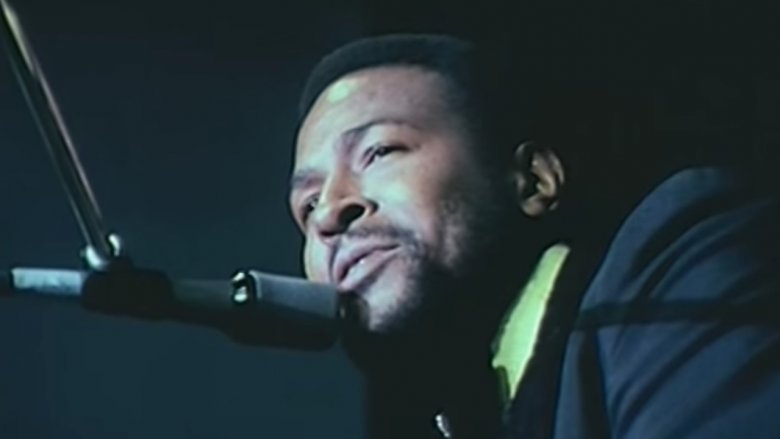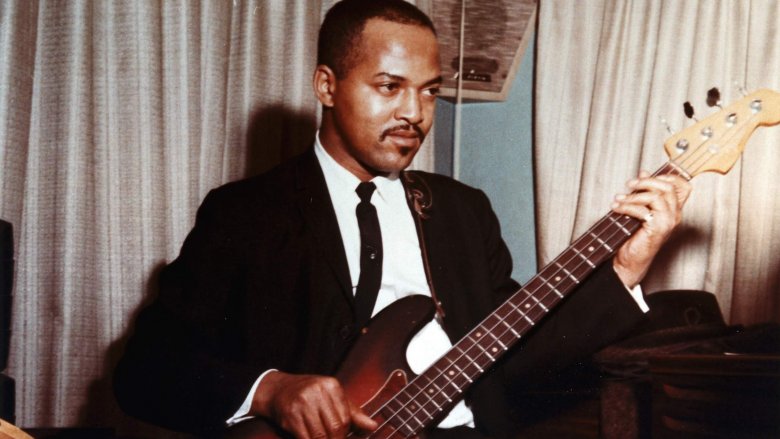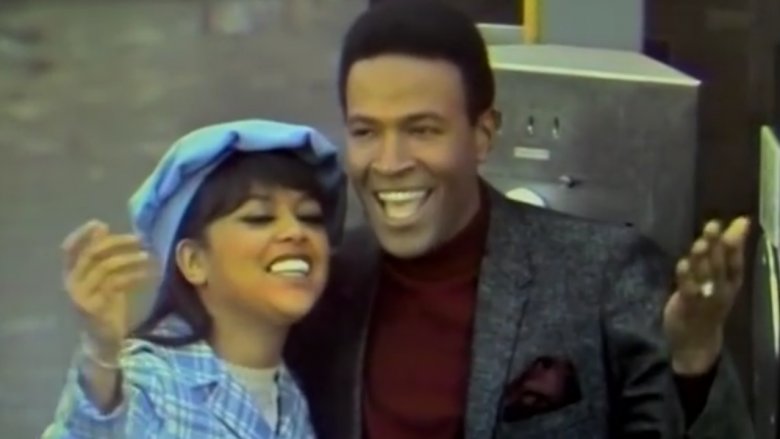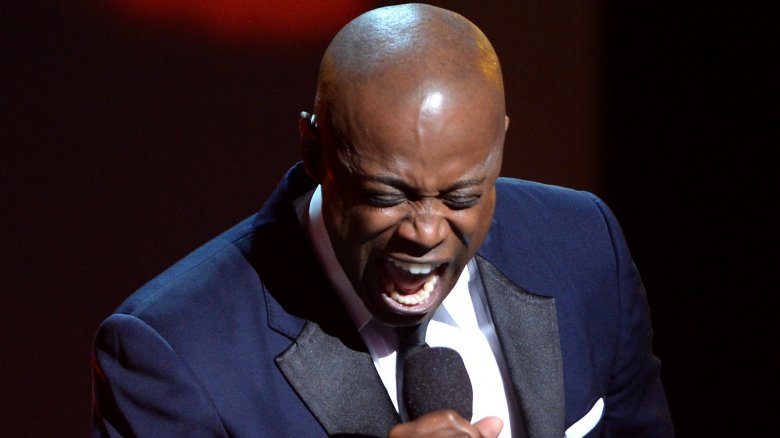The Tragic Real-Life Stories Of Motown Stars
There's no business like show business, and there's no sound like Motown's. Renowned for producing "glorious melodies and killer hooks," Motown is the birthplace of quite a few iconic music careers. If Michael Jackson ever thrilled you, if the Supremes keep you hanging on, or if you love listening to Lionel Richie all night long, you have Motown to thank. Founded in 1959 in Detroit and later merged with Universal, the legendary record label was started with an $800 loan taken from the family savings of founder Berry Gordy. A Motor City native, Gordy previously worked in a car plant and applied an "assembly line" mentality to creating quality music.
Motown's original headquarters on West Grand Boulevard more than earned its nickname: Hitsville, USA. The label's remarkable artists cranked out an enormous number of hits, some of which people still jam to today. Sadly, many of Hitsville's residents had hard-knock lives. Poverty, violence, and devastating illnesses beset some of Motown's brightest stars. In the cruelest, most knife-like of twists it turns out that sometimes people who give the world immense pleasure have gone through a world of pain.
James Jamerson created the basis for Motown's sound but suffered in obscurity
Berry Gordy characterized the Motown sound as "rats, roaches, soul, guts, and love." Those elements came together in the Snake Pit, a studio in the basement of Motown's Detroit headquarters. There a group background musicians called the Funk Brothers hammered out masterpieces. Among those hit-makers was James Jamerson. Described by Gordy as a "genius on the bass" and "incredible improviser," Jamerson heavily shaped dozens of Motown classics, including "You Keep Me Hanging on" by the Supremes and Marvin Gaye's "What's Going On?"
Unfortunately, Jamerson's job was less than thankless. Per OZY, during the 1960s it was common for record companies not to acknowledge background musicians, "but Motown's negligence was extraordinary." The Funk Brothers didn't earn "enough money to survive without doing graveyard gigs" at clubs. Jamerson later got snubbed at Motown's 25th anniversary and was barred from going backstage. These were insults to an injury-filled life.
According to All Music, Jamerson walked with a limp because of a bicycle accident that left him wheelchair-bound for a year and self-conscious for the rest of his life. While honing his talents after high school he started drinking and ultimately descended into alcoholism. Withered by addiction and emotional problems, he had numerous stays at hospitals and mental institutions toward the end of his life. In a final insult, Jamerson's Fender Precision Bass was stolen shortly before Jamerson died of pneumonia at age 42.
Mary Wells lost her stellar voice to cancer
Before 1962 Motown had never had a top 10 song. Mary Wells not only cracked the top 10, but two years later she sang Motown's first #1 hit — "My Guy." Upbeat and syrupy sweet, "My Guy" sounded nothing like the bitterness she experienced with guys in her own life.
At age 17 Wells married Motown background singer Herman Griffin. As recounted in Mary Wells: The Tumultuous Life of Motown's First Superstar, they frequently argued and Griffin cheated with a prostitute. Disturbingly, he also forced Wells to terminate two pregnancies "because of [her] career." They divorced in 1963 and in 1964 Wells parted ways with Motown because she felt the company underpaid her. However, her post-Motown career floundered.
Wells continued to have ill-fated relationships. She married Cecil Womack, had an affair with his brother, and attempted suicide because of the intense guilt she felt. Later, she became addicted to heroin. Also a heavy smoker, Wells developed laryngeal cancer, which destroyed her voice. Reduced to whispering her songs, she could no longer perform, went broke from medical expenses, and got evicted from her apartment. A slew of celebrities and supporters, including Bruce Springsteen and Phil Collins, helped her financially but nobody could save her. According to her daughter, Wells never complained — "She only cried." The singer died at age 49.
If you or anyone you know is having suicidal thoughts, please call the National Suicide Prevention Lifeline at 1-800-273-TALK (8255).
Tammi Terrell was brutally mistreated by romantic partners and died young
As Tammi Terrell and Marvin Gaye would say, ain't nothing like the real thing. Gaye may have had duet success with Mary Wells and Diana Ross, but Terrell really brought out the best in him. Together they performed some of the most riveting love songs of all time, including "Ain't No Mountain High Enough" and "You're All I Need to Get By." But while she and Gaye always hit the right notes together, the partners in her private life horribly wronged her.
Before joining Motown, Terrell worked for James Brown. The singers also dated, and while performing for Brown's label Terrell released the single "I Cried," whose title sums up her relationship with the Godfather of Soul. Brown beat Terrell bloody, according to Bobby Bennett, a former member of Brown's band. "Tammi left him because she didn't want her butt whipped." Sadly, she eventually entered the arms of another abuser: Temptations singer David Ruffin.
By all accounts, Ruffin treated Terrell terribly. Their relationship allegedly ended after Ruffin struck her face with a motorcycle helmet. According to the Michigan Chronicle, rumor has long held that Ruffin caused Terrell's death by hitting her head with a hammer. In reality, she died of a brain tumor. Terrell's tumor was discovered after she collapsed in Marvin Gaye's arms onstage. She would undergo eight surgeries that impaired her memory and left her partially paralyzed. Terrell was only 24 when she died.
Marvin Gaye was killed by his abusive father
A magnificent singer and songwriter, Marvin Gaye made music that moved human hearts to different beats. He turned his voice into an aphrodisiac in "Let's Get It On," voiced the widespread anxieties surrounding the Vietnam War in "What's Going On?" and championed environmentalism in "Mercy, Mercy Me." But the beauty he created stood in stark contrast to the ugliness in Gaye's life.
Gaye (originally spelled "Gay") was the son of Marvin Gay Sr., a preacher with a taste for drinking, cross-dressing, and violence. Gay Sr. subjected young Marvin to hellish beatings. As the singer later recalled, "By the time I was 12 there wasn't an inch of my body that hadn't been bruised and beaten." With soaring fame came more pain. In 1970, Gaye's singing partner of three years, Tammi Terrell, died of a brain tumor. Deeply depressed by the loss, he nearly quit the music business. He had multiple divorces, struggled with drug addiction, and became so paranoid that he reportedly "had people testing his food and water and bodyguards with sub-machine guns." In 1983 the unglued singer moved back home with his parents. A day before his 45th birthday he got into a fight with his father, who shot him. Marvin Gaye's final words were said to be, "I got what I wanted. ... I couldn't do it myself, so I made him do it."
Florence Ballard's life was marred by trauma and betrayal
In 1964, America welcomed a British invasion. But even as the Beatles took the U.S. by storm, the Supremes dominated charts. Starting in 1964 they had five consecutive #1 hits, proving the Supremes could be every bit as fabulous as the Fab Four. And just as the Beatles grappled with tragedy, the Supremes had their unfair share of sorrow. In 1994, Mary Wilson got into a car wreck that killed her teenage son. Two years later, lead singer Diana Ross would mourn her brother and sister-in-law, who were found decaying in a basement after being suffocated to death. And Florence Ballard's life often seemed like a parade of heartache and betrayal.
When Ballard was 15 her father died, and at 17 she was raped by an acquaintance she had trusted to drive her home. Afterward, she struggled to trust anyone. Before long she dropped out of high school, began drinking heavily, and ruined her own career. Ballard actually founded the Supremes and was initially their lead singer but got booted from the group after repeatedly missing shows and scheduled recordings. A failed attempt at a solo career was made worse by her lawyer, who allegedly embezzled money from her.
Ballard wound up on welfare, and her problems became fodder for the press. According to her sister, Ballard was also battered by a violent husband. In 1976 she passed away from a coronary blood clot. She was just 32 years old.
The DeBarges endured horrific abuse by their father
The 1985 film The Last Dragon is memorable for its campy antagonist Sho'nuff, its corny-yet-badass hero Bruce Leroy, and its fantastic soundtrack. The list of musicians included Motown heavy hitters like the Temptations, Stevie Wonder, and Smokey Robinson, but it was DeBarge that shined brightest with what would be their biggest hit: "Rhythm of the Night." That song plus others like "I Like It" and "Who's Loving Donna Now?" helped make the '80s feel magical. But beneath DeBarge's musical wizardry was a story of abhorrent abuse.
DeBarge's members were part of the larger DeBarge family, which included a whopping 10 siblings. Eight of them signed with Motown, six would join the DeBarge singing group at different points, and all of them had hellish childhoods courtesy of their father, Robert. Chico DeBarge, who had a solo career, told Vibe, "My father sexually molested a lot of my brothers and sisters." According to DeBarge matriarch Etterlene, Robert battered her and the kids. Unsurprisingly, all eight singing DeBarges would engage in self-destructive behavior.
The siblings wrecked their careers and bodies with hard drugs, and much of their adulthoods became a parade of arrests and health problems. Standout star El was intermittently homeless and had strained relationships with his 12 children. The grimmest fate befell the ultra-talented Bobby, who was jailed for drug offenses, contracted HIV, and passed away from AIDS-related complications.
KEM overcame molestation and homelessness
The 1960s ushered in the golden age of Motown, when the Jackson 5 were riding high, Diana Ross reigned supreme, and Smokey Robinson began a miraculous run of nearly 40 hit songs. In 1966 "three out of every four Motown releases made the charts," according to Detroit News. And though no one knew it at the time, in 1969 a future Motown star was born — literally. Kim Owens, better known as KEM, would grow up to be a Grammy-nominated singer and sell millions of albums. But his road to success was long and torturous.
Looking back on his childhood, KEM told MLive, "I had a lot of what we would call today low self-esteem, childhood depression, anxiety — all of the normal things adolescents go through magnified by 50." A survivor of sexual abuse, he tried to drown his trauma in alcohol and drugs as a young teenager. For years he didn't tell his parents about the abuse, and, unaware of why he was acting out, they kicked him out.
KEM was homeless for about four years. He ate from trash cans and ran afoul of the law. But in 1990 he took stock of his life and realized he needed help. He found it at a Salvation Army treatment facility, where he replaced his alcohol habit with a piano habit. Music didn't just become KEM's livelihood; it helped save his life.
Paul Williams met a devastating end
If you've got sunshine on a cloudy day, we don't need to guess what made you feel that way. We know it was the Temptations. A quintet that crossed genres and lasted across musical eras, they changed with the times while simultaneously creating timeless songs. We're talking about "My Girl," "Just My Imagination," "Papa Was a Rolling Stone," and so many wonderful others. Despite thriving in the limelight, the Temptations had their share of sour notes. Perhaps none played out more painfully than the downfall of Paul Williams.
Paul Williams was one of the Temptations' original lead singers, and the only founding member who didn't originally drink alcohol. Fellow founding member Otis Williams recalled, "Paul was drinking milk. And he would say, 'Now, you guys should stop drinking that. Drink milk. Stay healthy.'" Unfortunately, Paul didn't stay healthy. He suffered from sickle cell anemia, which can cause debilitating pain. That pain, according to the Guardian, drove Paul to drink alcohol.
Otis told Deseret News that Paul sometimes drank "two to three fifths of Courvoisier a day." Things "got so bad that his stamina, his respiratory system started fading on him." Too sick to perform, Paul had to leave the group. Two years later, Paul parked two blocks away from Motown and took his own life.
If you or anyone you know is having suicidal thoughts, please call the National Suicide Prevention Lifeline at 1-800-273-TALK (8255).
David Ruffin completely self-destructed
The Temptations have existed since the 1960s in different forms. Formerly known as the Elgins, they would change their name, lineup, and lead singer over the years. Each Temptations frontman offered something special — whether it was the "soaring falsetto" of tenor Eddie Kendricks, Dennis Edwards' funk-rock contributions, Otis WIlliams' brilliant baritone, or Paul Williams' deeply soulful live performances. But the frontman most associated with the Temptations' heyday was David Ruffin.
Ruffin had smooth moves and massive magnetism. As the Sun-Sentinel put it, "this human beanpole could do it all — splits, flips, spins, steps — and then he'd start to sing." But to put it bluntly, his greatness as a performer was eclipsed by his horribleness as a person. "The son of a strict and sometimes abusive Baptist minister," per Legacy.com, Ruffin terrorized singer and onetime girlfriend Tammi Terrell. He reportedly bashed her head with a hammer and hit her face with a motorcycle helmet. He also had an insufferable ego and rode separately from his fellow Temptations in a mink-lined limo. But even people who do detestable things can be tragic figures. In Ruffin's case, he wasted his immense talent and ultimately destroyed himself.
Drug addiction was his undoing. As he became increasingly uncontrollable he got kicked out of the Temptations. He had some solo success but never fully succeeded at kicking his drug habit, which hindered his career. In 1991 a 50-year-old Ruffin collapsed in a crack house and died shortly thereafter at the hospital.
Michael Jackson's loneliness drove him to hang out with mannequins
"We are as close as two friends can be." Michael Jackson didn't sing those words about a person but about music. That simple line from the song "Music in Me" inadvertently captures the profound sadness of Jackson's upbringing. At roughly 5 years old he joined the Jackson 5 and at 13 he started a solo career. In The Michael Jackson Tapes, he described feeling deprived of his childhood: "I wanted so badly to play in the park across the street because the kids were playing baseball and football but I had to record. ... I sat there looking at the kids with tears running down my face and I would say, 'I am trapped.'" Hopelessly lonely, he would keep mannequins around to feel less alone.
Despite yearning to be around people Jackson grew to fear crowds when he wasn't onstage. He was also utterly petrified of his father, Joe, who used to beat Jackson so badly that the King of Pop later admitted to vomiting and fainting in his presence. Obsessed with compensating for his lost boyhood, Jackson dubbed his adulthood home the Neverland Ranch and allegedly underwent plastic surgeries to resemble Peter Pan. But his fixation on all things youthful may have betrayed something sinister. In 1993 and 2003 he was accused of child molestation. Since his death in 2009 the world has continued to wonder if the man Jackson saw in the mirror was a monster.
La Toya Jackson was a black sheep and abuse victim
Described by All Music as "perhaps the least-talented" Jackson sibling, La Toya Jackson wasn't a Motown star like her brothers. However, the record label nonetheless made her famous before she became infamous. She began her music career singing backup for the Jackson 5 and even performed on stage in Las Vegas. Later she dated Motown star Bobby DeBarge, who reportedly wrote the song "I Call Your Name" about her. Perhaps you could call La Toya Motown-adjacent, near the "real" stars but never truly accepted as one. That outsider status, created and perpetuated by her indirect ties to Motown, helped shape her life as the black sheep in a dysfunctional famous family.
People magazine referred to La Toya as the Jacksons' "fallen angel," noting that she fell out of favor by posing for Playboy in her birthday suit and accusing family patriarch Joe Jackson of unspeakable acts in her autobiography. She claimed Joe pointed guns at his kids to get their attention and savagely beat and molested her. Joe denied the claims and blamed them on brainwashing by La Toya's then-husband and manager, Jack Gordon. She married Gordon to get away from home at age 33, but she found herself living with a new abuser. Gordon physically attacked La Toya and then blamed her for his scumbaggery. Gordon died in 2005.











